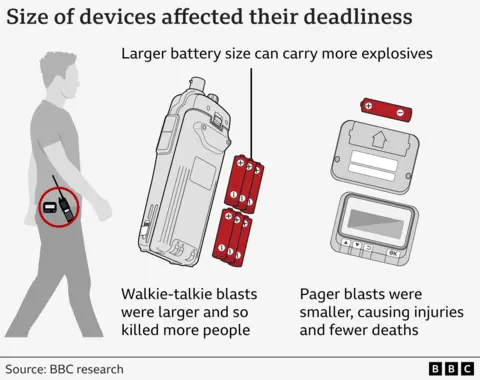 AFP
AFPAfter thousands of pagers and radio devices exploded in two separate incidents in Lebanon – injuring thousands of people and killing at least 37 – details are still being pieced together as to how such an operation was carried out.
Lebanon and Hezbollah, whose members and communication systems were targeted, have blamed Israel – though Israel is yet to comment.
The BBC has followed a trail from Taiwan, to Japan, Hungary, Israel and back to Lebanon.
Here are the unanswered questions.
How were the pagers compromised?
Some early speculation suggested that the pagers could have been targeted by a complex hack that caused them to explode. But that theory was quickly dismissed by experts.
To cause damage on the scale that they did, it is probable they were rigged with explosives before they entered Hezbollah’s possession, experts say.
Images of the broken remains of the pagers show the logo of a small Taiwanese electronics manufacturer: Gold Apollo.
The BBC visited the company’s offices, situated on a large business park in a nondescript suburb of Taipei.
The company’s founder, Hsu Ching-Kuang, seemed shocked. He denied the business had anything to do with the operation.
“You look at the pictures from Lebanon,” he told reporters outside his firm’s offices. “They don’t have any mark saying Made in Taiwan on them, we did not make those pagers!”
Instead – he pointed to a Hungarian company: BAC Consulting.
Mr Hsu said that three years ago he had licensed Gold Apollo’s trademark to BAC, allowing them to use Gold Apollo’s name on their own pagers.
He said the money transfers from BAC had been “very strange” – and that there had been problems with the payments, which had come from the Middle East.

What did a Hungarian company have to do with it?
The BBC went to the registered office of BAC Consulting, situated in a residential area of the Hungarian capital, Budapest.
The address appeared to be shared by 12 other companies – and no-one in the building could tell us anything about BAC Consulting at all.
Officials in Hungary say the firm, which was first incorporated in 2022, was merely a “trading intermediary with no manufacturing or operational site” in the country.
A brochure for BAC, published on LinkedIn, lists eight organisations it claims to have worked with – including the UK Department for International Development (DfID).
The UK Foreign Office – which has taken on DfID’s responsibilities – told the BBC it was in the process of investigating. But…
Click Here to Read the Full Original Article at BBC News…


